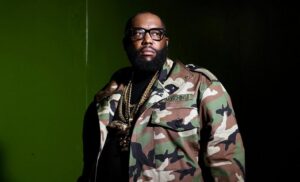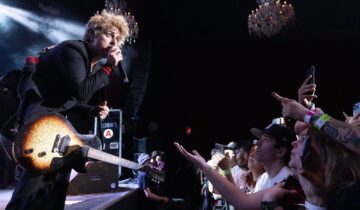 Killer Mike Says His New Album, ‘Michael,’ Is “Like A Prodigal Son Coming Home”
Killer Mike Says His New Album, ‘Michael,’ Is “Like A Prodigal Son Coming Home”
‘Michael,’ Killer Mike’s first solo album in more than a decade drops June 16. He spoke to GRAMMY.com about creating a portrait of the Southern rap cyphers, Sunday church services, and barbershop discourse that shaped who he is today.
GARY MOSKOWITZ | GRAMMYS | JUN 15, 2023
Photo by Jonathan-Mannion
For GRAMMY.com: After more than 20 years in hip-hop — as one-half of the supergroup Run The Jewels and also as a solo artist — the Atlanta rapper Killer Mike is ready to make what he calls “a generational statement.”
Born Michael Render, the activist rapper’s statement comes in the form of his personal “origin story”: a 14-song solo album called Michael. The album, Killer Mike’s sixth solo effort, drops June 16 and follows 2012’s R.A.P. Music. In support of the new record, he’s touring 19 U.S. cities through Aug. 5.
“I’m one of the best rappers on the face of the earth, and that is authentic. Go to the records. My verses have proved it,” Render, 48, told GRAMMY.com. “I’m tired of sitting and waiting for people to say it for me. I’m not waiting, I’m doing it now. My run matters. I’m not gonna die with a woulda been coulda been eulogy.”
Michael stands in contrast to the big, bombastic (and less personal) vibe of Run The Jewels, who have released four albums since forming in 2013. While Render’s solo outings have always been a mix of bravado and personal, his latest is particularly deep and insightful, dealing with the death of his mother, and his life growing up in the predominantly Black neighborhood Collier Heights, Atlanta.
“There is a character behind Killer Mike that is a whole human being that I’ve always wanted people to meet and introduce so they can understand the nuance of why I am,” Render said during an event at SXSW 2023. “It is about helping other human beings understand that I share an experience with you, that you can meet me at, that transcends color, that transcends class, that transcends geographic location, and I meet you right at your humanity.”
On Michael, Render puts his guard down. He allows himself to grieve the death of his mother and apologize for selling drugs as a teenager. Throughout the autobiographical album, Render paints a portrait of the southern rap cyphers, Sunday church services, and barbershop discourse that shaped who he is today.
“That Killer Mike character was invented when I was 9. I just wanted to be an MC, and Killer Mike was like me being a superhero,” Render tells GRAMMY.com. “But when you hear me talking about my mother, I’m empty now. It’s not sad, but it’s about missing and wanting.”
Render’s parents were teenagers when he was born, so he was raised in part by his grandparents in Collier Heights, Atlanta. Render credits the culture of his community with shaping who is today.
“I didn’t grow up with insecurities about race, I grew up in a Black majority,” he tells GRAMMY.com. “The closest I got to white people growing up was watching Bob Ross or ‘The Wonder Years’ on TV. But all my real heroes looked like me.”
Render says he never felt inhibited by his Blackness, because Blackness was celebrated in Collier Heights. His community introduced him to Black intellectuals like James Baldwin and Langston Hughes, who also celebrated Blackness. It never occurred to Render to not pursue hip-hop or politics or activism — and he never doubted that he could be an artist or MC.
He first rapped on Atlanta-based hip-hop group Outkast’s 2000 album Stankonia, and launched a solo career soon after. In the 2000s, his songs landed on Billboard charts and the EA Sports “Madden NFL 2004” football video game. Render also did voice over work during the 2000s for Adult Swim and appeared in films like Idlewild and ATL. He guest-rapped on Outkast’s 2003 double album Speakerboxxx/The Love Below, which was nominated for six golden gramophones at the 2004 GRAMMYs and won three, including Album Of The Year.
Two very important relationships forged in the 2010s have done much to shape Render’s trajectory since: one with producer and rapper El-P (the other half of Run The Jewels), the other with Vermont Senator Bernie Sanders.
El-P is essentially the yin to Killer Mike’s yang. El-P produced Render’s previous solo records, and the two have been collaborating ever since; Killer Mike has called their relationship a “marriage made in heaven.” Run The Jewels has toured with Rage Against The Machine and Lorde, opened for Jack White at Madison Square Garden, been nominated for a GRAMMY Award, and won NME’s Best International Band award in 2018. Rolling Stone called Run The Jewels “brash” and added, “If there were a GRAMMY for Most Creative Ways to Say ‘We’re the Best,’ these guys would win it, or take it by gunpoint.”
Render’s political activism kicked into high gear in 2015, first with lectures at NYU and MIT on police brutality, for-profit jails, and racism in America. He made a last-minute — and ultimately unsuccessful — run for a Georgia state representative seat, and he forged an unlikely public friendship with then-presidential candidate Senator Bernie Sanders. Render told reporters that he and Sanders were “two angry radical guys, one 74 and white, one 40 and Black, finding common ground.”
Render took his politics and activism much further. He co-founded an online banking system for Black and Latinx communities alongside former Atlanta mayor and civil rights leader Andrew Young, and has written op-eds in response to the police killings of Michael Brown and Eric Garner and the Baltimore uprisings in response to Freddie Gray’s death. On the 2019 Netflix show, “Trigger Warning,” Render explored notions of land ownership, gangs, education, and consumerism.
All of his experiences — as a child of the South, as a rapper, and as a political thinker — inform the new album.
“Remember when Ta-Nehisi Coates wrote ‘Letter to My Son’? People got a glimpse into Blackhood that wasn’t about absentee fatherhood and other cliches,” Render tells GRAMMY.com. “Similarly, my album, even if you haven’t lived my life, it gives you a chance to be a voyeur, and that’s important.”
Michael takes its time to unfold; personal subject matter unfolds verse after verse, over laid-back tempos executive produced by No I.D. Somber music provides a bed for Render and guests — among them, Andre 3000, Young Thug, Future, Ty Dolla $ign, Blxst, Curren$y, and Mozzy — to stretch out on. Slightly more aggressive, urgent-sounding songs like opening track “Down By Law” and “Talkin Dat SHIT!,” which appears later in the album, are buffered by tunes that could uplift a church congregation.
“It’s imperative that I get that out and introduce people to this buck-toothed kid who grew up with hip-hop, out of wedlock fatherhood,” Render says. “This record is like a prodigal son coming home. It’s my generational statement. If August Wilson was writing a rap album, this would be his ‘Fences.'”



